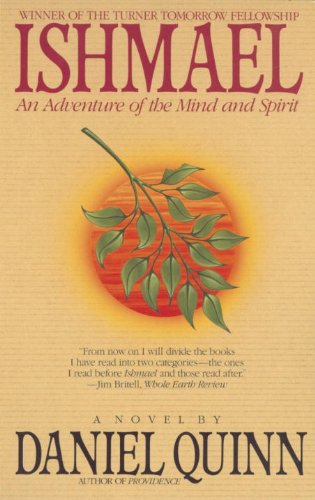Have you ever had a book, movie, poem or other form of media completely change your perspective of the social culture of the world?
Daniel Quinn’s 1992 novel “Ishmael” is a thought-provoking look into one’s own humanity.
“Teacher seeks pupil. Must have an earnest desire to save the world.”
This fictional story is of a student-teacher relationship where not only is the narrator of the story the student but so is the reader. Surprisingly, the teacher is a gorilla named Ishmael.
Quinn’s natural way of leading the narrator/reader to figure out solutions to problems on his own rather than force-feed the information to us. The way the story is written left me wanting to theoretically come to “class” each day and see what new information Ishmael had for me or turn the next page, not wanting to put the book down.
Similarly, when you enjoy a class and professor, you come each day excited to learn some new interesting information that you enjoy taking in. But the topics discussed in “Ishmael” go outside the bounds of what I previously understood about the way in which humanity functions in the world.
A reoccurring idea Ishmael presents to his student is the idea of “mother culture.” This idea is that each large culture has a broad overarching voice in your head telling you there is only one way you ought to live. In reality, there is more than one way to live.
The significance of the information presented in “Ishmael” is not limited to the negative effects humanity has had on the environment. Or any number of awful things humans have done throughout time. In a broad context, humanity has now forgotten that we, too exist within nature. Quinn describes this as happening once man was able to determine good vs. evil, we were able to decide what lives and what dies.
Quinn describes two groups of people in Ishmael: Leavers and Takers. Leavers are the type of people who existed before the agricultural revolution. People who believe they exist in the world. Living off the land, not always knowing where their next meal could come from. While the Takers believe that the Earth exists for them and that it is their responsibility to change the Earth to provide for themselves. Leavers belong to the world, while takers believe the world belongs to them.
The ideas in “Ishmael” don’t spell out doom and disaster nor does it tell us what actions we must take to stop the world from ending. Quinn illustrates how humanity’s highly functioning civilizations are in fact actually highly dysfunctional. More importantly, how humanity has cultivated a culture existing outside or above nature. Ishmael aims to teach his pupil that humanity is still a part of nature and how large of an impact we have.
Quinn gently reminds the reader where humanity belongs in nature. While I do not agree with every point he makes in the book, the ideas that really resonated with me should be shared with as many people as possible. “Man is not alone on this planet. He is part of a community upon which he depends absolutely.”
Teacher Ishmael tells his student that spreading the knowledge he’s learned to 100 people is important. So, if you have the opportunity to read “Ishmael,” I urge you to do so because 20 years from now, it is still just as relevant.

